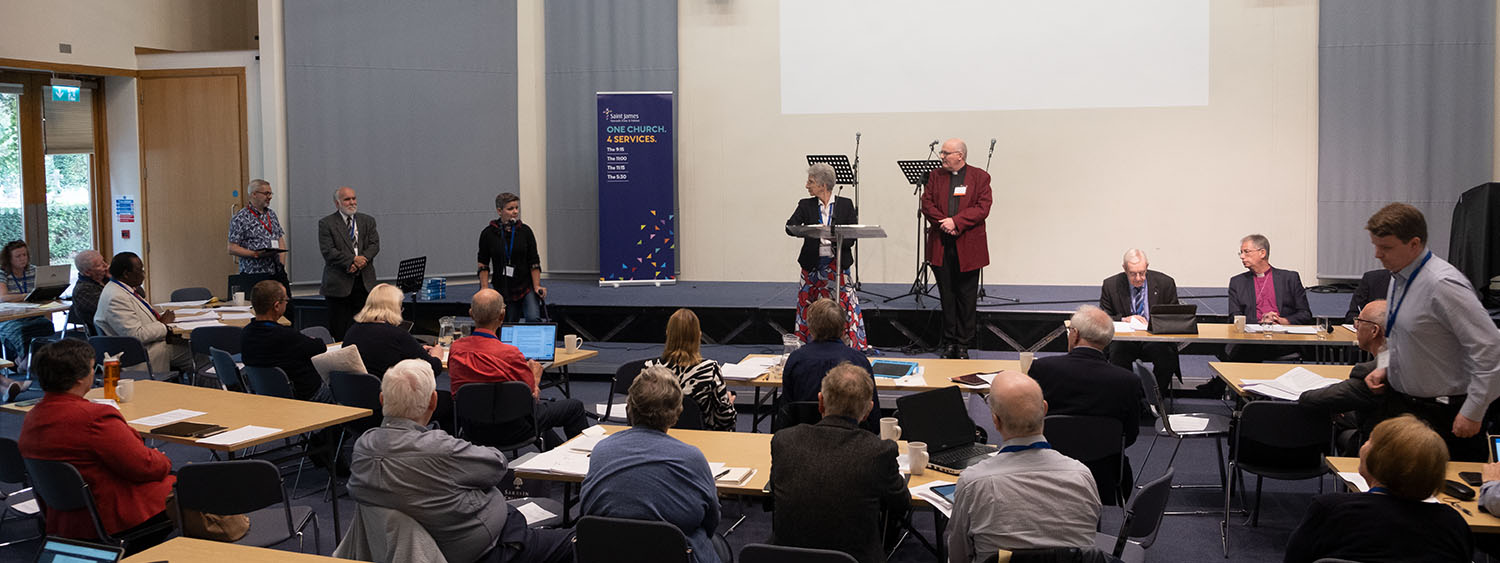Oxford Diocesan Synod members debate the proposals, 11 June 2022
The Diocese of Oxford has approved £10 million expenditure on environmental works to improve the carbon footprint of vicarages and better care for its clergy. The investment is part of an ambitious plan by the diocese to reach net zero carbon emissions by 2035.
The diocese surveyed 427 clergy houses during the last year to establish a carbon baseline for the properties. A net zero retrofit housing strategy will now set about improving the energy and heating efficiency of vicarages.
Solar panels have already been fitted to over 50 properties, but the diocese now plans to do significantly more by addressing the energy loss from its vicarages and prepare for improvements in heat pump technology.
Project implementation starts in late 2022, ramping up in 2023, with environmental works to clergy housing in the diocese. This will include the installation of long-term heat demand reduction measures including wall, floor and roof insulation, and improved window and door draft proofing. By 2024 the programme accelerates significantly again to see major improvements to vicarages across the diocesan portfolio including solar panels and additional insulation. As heat pump technology improves, fossil fuel boilers will be replaced with heat pumps.
Speaking at Oxford Diocesan Synod, where the plan was approved at the weekend, The Rt Revd Dr Steven Croft, Bishop of Oxford, said; “The target of limiting global warming to 1.5 degrees is already slipping away from us. Society has only a limited time to act but we should be in no doubt whatsoever that there is a strong and deep possibility of change if we act now.
The Church of England can play a key part in the journey to net zero through example and leadership, but this must be through actions as well as through our words. This is a major investment by the Diocese of Oxford towards achieving our net zero carbon emissions target. The investment we are making is also vital to the credibility of our other environmental programmes. We hope that many others will take notice of such a major investment and the need to care for creation now.
Parishes will not need to raise new funds for the Net Zero Housing Strategy.
Notes for editors
- With over 800 churches and over 400 vicarages, the Diocese of Oxford is one of the largest in the Church of England.
- The Net Zero Housing Strategy will mean that clergy housing is properly insulated, including the provision of more energy efficient doors and windows.
- This phase of the programme will also include pilot projects for new heating sources.
- Investment was approved by Diocesan Synod, which is the governing body of the Church of England in Oxfordshire, Berkshire,Buckinghamshire,and Milton Keynes.
- The Net Zero Housing Strategy will be funded without any consequential increase in Parish Share. Investment gains from the diocesan Glebe (land) portfolio have increased the overall amount of monies available to the diocese. These monies have indirectly enabled the diocese to launch a Development Fund and now the new Net Zero Housing Strategy.
What has the Diocese of Oxford done so far?
- The Diocesan Synod declared a Climate Emergency in March 2020 and is committed reaching net zero target carbon emission by 2035 or as soon as possible thereafter.
- In 2021, the diocese completed its divestment from fossil fuels.
- A leading advocate of fossil fuel divestment within the national Church, in April 2021 Bishop Steven was among 13 peers appointed to the Lords Select Committee for the environment and climate change. Steven has previously called for "nothing less than an ecological conversion of every person and every part of society".
- The Bishop of Reading, the Rt Revd Olivia Graham, is a member of the Church of England Environmental Task Group. Bishop Olivia was present at COP26 in Glasgow last year, where she said; “Leaders from all faiths are on the same page about climate chaos and environmental crises.”
- Church House Oxford is powered by renewable electricity. All four bishops in the diocese drive electric or hybrid vehicles.
- The newly completed Berkshire Area Office, built next to a Grade 1 listed church, is constructed to the best possible energy efficiency standards.
- 120 churches have undertaken energy audits subsidised by the diocese, and currently 153 churches in the diocese have registered with the Eco Church scheme.
- Our six-point strategy for the environment:
- Ensuring that everyone has access to resources for prayer, advocacy, and action.
- Nurturing everyday faith and discipleship and creating clear leadership pathways.
- Promoting resilience as churches, schools and communities increasingly grapple with the effects of climate change.
- Achieving our net zero targets – which is happening across a range of different activities
- Ensuring alignment with the call for justice and working in partnership wherever we can.
For media enquiries, please contact the press office on 01865 208 277 (out of hours 07824 906 839) or email communications@oxford.anglican.org.

